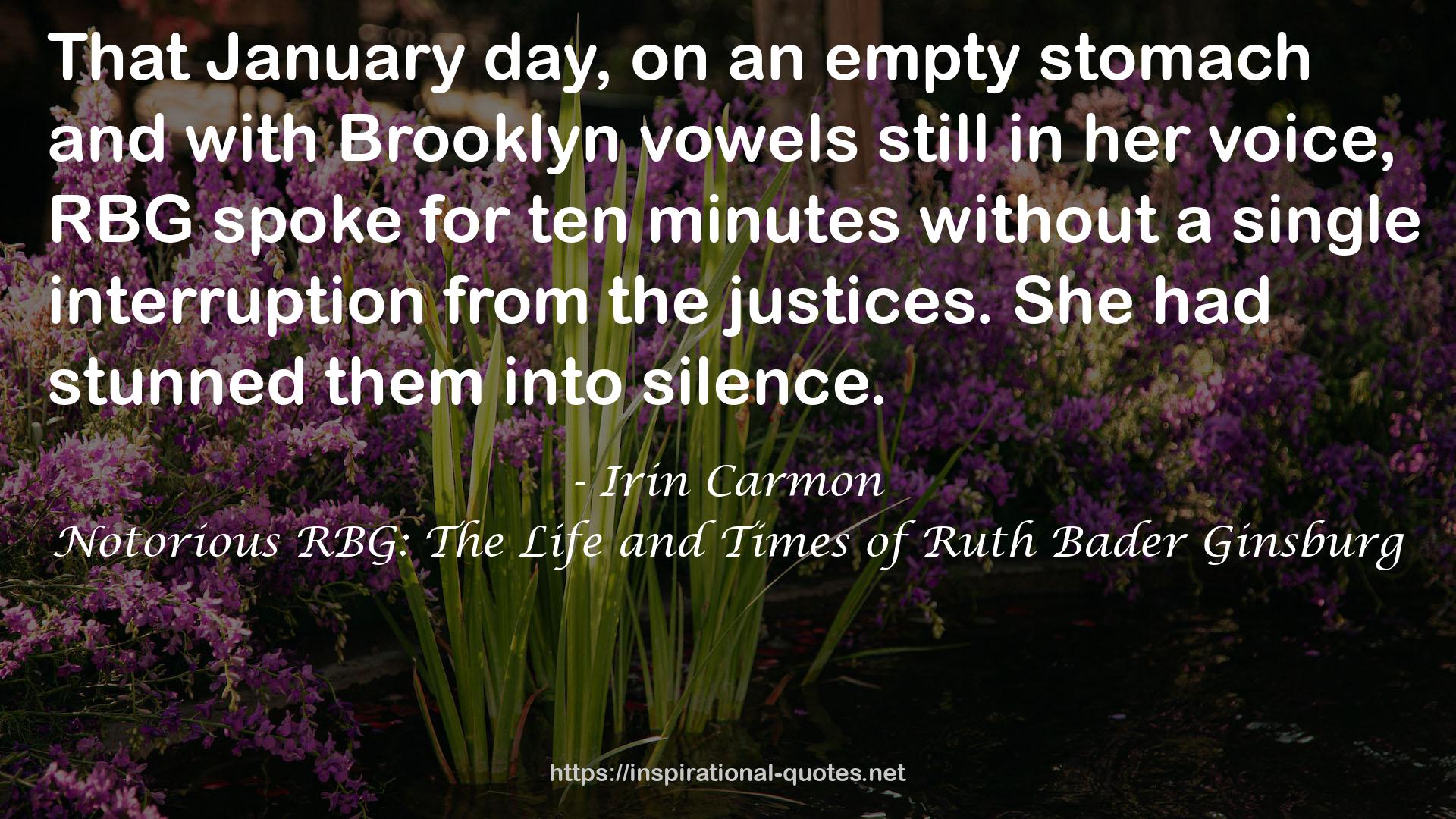85
" No doubt could be read on Clinton’s face that afternoon. He introduced RBG as a hero to the women’s movement and a legal star. Above all, Clinton said, he’d chosen her for being a moderate, neither liberal nor conservative, someone whose “moral imagination has cooled the fires of her colleagues’ discord. “Ruth Bader Ginsburg cannot be called a liberal or a conservative; she has proved herself too thoughtful for such labels,” the president said. “Having experienced discrimination,” he added, “she devoted the next twenty years of her career to fighting it and making this country a better place for our wives, our mothers, our sisters, and our daughters.” RBG would have added, “And our husbands, our fathers, our brothers, and our sons. "
― Irin Carmon , Notorious RBG: The Life and Times of Ruth Bader Ginsburg
95
" RBG’s image as a moderate was clinched in March 1993, in a speech she gave at New York University known as the Madison Lecture. Sweeping judicial opinions, she told the audience, packed with many of her old New York friends, were counterproductive. Popular movements and legislatures had to first spur social change, or else there would be a backlash to the courts stepping in. As case in point, RBG chose an opinion that was very personal to plenty of people listening: Roe v. Wade. The right had been aiming to overturn Roe for decades, and they’d gotten very close only months before the speech with Planned Parenthood v. Casey. Justices Anthony Kennedy, David Souter, and Sandra Day O’Connor had instead brokered a compromise, allowing states to put restrictions on abortion as long as they didn’t pose an “undue burden” on women—or ban it before viability. Neither side was thrilled, but Roe was safe, at least for the moment. Just as feminists had caught their breath, RBG declared that Roe itself was the problem. If only the court had acted more slowly, RBG said, and cut down one state law at a time the way she had gotten them to do with the jury and benefit cases. The justices could have been persuaded to build an architecture of women’s equality that could house reproductive freedom. She said the very boldness of Roe, striking down all abortion bans until viability, had “halted a political process that was moving in a reform direction and thereby, I believe, prolonged divisiveness and deferred stable settlement of the issue.” This analysis remains controversial among historians, who say the political process of abortion access had stalled before Roe. Meanwhile, the record shows that there was no overnight eruption after Roe. In 1975, two years after the decision, no senator asked Supreme Court nominee John Paul Stevens about abortion. But Republicans, some of whom had been pro-choice, soon learned that being the anti-abortion party promised gains. And even if the court had taken another path, women’s sexual liberation and autonomy might have still been profoundly unsettling. Still, RBG stuck to her guns, in the firm belief that lasting change is incremental. For the feminists and lawyers listening to her Madison Lecture, RBG’s argument felt like a betrayal. At dinner after the lecture, Burt Neuborne remembers, other feminists tore into their old friend. “They felt that Roe was so precarious, they were worried such an expression from Ruth would lead to it being overturned,” he recalls. Not long afterward, when New York senator Daniel Patrick Moynihan suggested to Clinton that RBG be elevated to the Supreme Court, the president responded, “The women are against her.” Ultimately, Erwin Griswold’s speech, with its comparison to Thurgood Marshall, helped convince Clinton otherwise. It was almost enough for RBG to forgive Griswold for everything else. "
― Irin Carmon , Notorious RBG: The Life and Times of Ruth Bader Ginsburg

